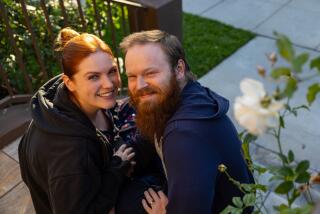When Teen Pregnancy Runs in the Family
ALOHA, Ore. — Following in her parents’ footsteps was not what Michelle Grant had planned.
But there she was: pregnant at age 17 and living back in Colorado with her mother, a year after running away. She had no money. She’d dropped out of school. And the baby’s father, nearly 14 years older, was 600 miles away.
A few weeks later, wearing a white sweater that she’d chosen at Goodwill, she married the father, Paul Grant, in a courthouse ceremony -- much as her own parents had done when Michelle’s mom was a pregnant teen.
Somehow, their fate had become hers, seemingly handed down from parent to child.
The shared experiences of pregnancy and young motherhood have been bonding points for Michelle and her mom, Debbie Tierney. Their relationship was turbulent when Michelle was growing up.
“I’d now say that my mom is my best friend. She really is,” said Michelle, who just turned 20 and is the mother of two. She and Tierney talk by phone several times a week, more than they did when Michelle was at home.
Still, Tierney says, as close as they’ve become, she never wanted her daughter to end up like her. She calls teen pregnancy the family curse -- something they have in common, yes -- but a twist of fate that she fears will forever hold Michelle back, as it did her.
“I thought she could ...,” Tierney pauses and starts again. “Well, I guess she still can have a good life, get a good job, be financially stable.
“This just makes it so much harder.”
The reasons behind the cycle of teen pregnancy are complicated and varied. But researchers do know that parents -- present and absent -- play a key role. They have found that a young mother’s loss of education and work opportunities tend to perpetuate the cycle.
That was the case for Michelle’s mom. She dropped out of college and often struggled financially to rear Michelle and her three brothers, especially after she and their father divorced.
Michelle is determined that it will be different for her family.
That’s what she told herself and her unborn baby, whom she felt kicking as she successfully completed the test for her GED. “If I can do this, things will be better,” she said, uttering what has become her personal mantra.
She and Paul have moved the family to Aloha, a suburb of Portland, and Michelle is taking a full load of classes at a nearby community college. She plans to become a nurse.
She’s as proud of the grades she’s earning -- an A, a few Bs and a C -- as she is of the photo albums she’s lovingly made for her children, Conner and Skyla, now 2 1/2 and 1.
“I want to do the best I can to help make my children better people,” Michelle said. “Some people might not believe it. But for the first time in my life, I really believe I can.”
Her optimism sometimes belies her difficult reality -- the kind her mother foresaw.
Last spring, Paul lost his job doing over-the-phone technical support for a cell phone company. His search for work has been slowed by a serious circulatory condition called phlebitis. And even with help from their families, Michelle says they sometimes throw bills they can’t pay in the trash.
“We feel like we’re two little kids playing house. We’re not taking care of ourselves. It’s a horrible feeling,” she said.
Her mom can’t help but worry.
“I tell her I’d do what I need to do to pay the bills. I’d get a second job, a third job. She says she understands, but nothing changes,” said Tierney, who works for an insurance company and lives in Aurora, Colo.
Born in Kentucky, Michelle spent most of her childhood in Colorado. Her mom says she was a bright, talkative child who didn’t like to share attention with her brothers.
When Michelle was 8, her parents divorced. And by Michelle’s own admission, her anger over the split made her increasingly difficult and willful. She often shifted between her parents’ homes, especially after her mom remarried. Her temper could be explosive.
“I had a reputation as the ‘problem child,’ ” Michelle said. “So, eventually, I kind of gave up trying to be good. It was always going to be my fault anyway.”
She remembers, at age 14, adding a line to a genealogy project for school: “I do not plan on having children,” she wrote next to her drawing of a crystal ball.
“I thought the world was too harsh to bring kids into it,” she now says. “I thought they’d be screwed up -- that I wouldn’t be a good mom.”
Then at 15, Michelle met Paul in an online computer chat room.
As their friendship deepened by telephone, her relationship with her parents worsened.
Shortly after her 16th birthday, she overheard her mom and stepfather, at their wits’ end, discuss sending her to a foster home.
She’d also been fighting more with her biological father, who pressed charges against her for hitting him. The threat of juvenile jail loomed.
Upset, Michelle asked Paul to wire money for a plane ticket to Portland. He did. And without a word, she left home on Dec. 1, 1998 -- ditching school and problems that she hoped to escape forever.
Paul, she says, offered a chance to start over and stuck by her when she eventually admitted lying about her age. (She had told him she was 18.)
“I just needed someone to be there for me, who would just trust me and have faith in me,” Michelle said, looking at Paul as he played on their living room floor with Skyla. “Everybody said he’d run away and leave me -- but he never did.”
That emotional security made having her own family seem possible. But financial security eluded Michelle and Paul, who moved to Corning, a small Northern California town, to live with his parents.
By summer, she was pregnant.
Michelle returned to Colorado, where she got her GED and spent a few days in jail to resolve the charges over the fight with her dad, although she no longer speaks to him. Meanwhile, Paul found work with a computer-maker in Chandler, Ariz. -- a sign, Michelle’s mom thought, that he was serious about supporting her daughter.
In February 2000, she signed papers allowing the marriage.
“I knew the baby was coming. And I didn’t see the point of keeping her from the life she wanted,” Tierney said. She added, “And honestly, it took some of the burden off me.”
Conner was born two months later, and the family eventually wound up in Oregon, where Paul has been in and out of technical-support jobs.
Because of his illness -- and resulting infections and blood clots in his legs -- he plans to apply for disability through Social Security if he can’t find work. Meanwhile, Michelle is looking for a weekend job to help replace monthly $600 unemployment checks that are about to run out.
Their struggles, Michelle says, have changed her view of family, especially her mom.
“I have a new respect for what she went through, raising me and my brothers,” she said.
Michelle’s expectations for her kids: “I want them to be confident and social. I want them to feel safe. I want them to feel like they can talk to me, trust me.”
And she wants them to get an education.
“I’m going to college so they can go to college,” she said as she picked up Conner. She moved her face close to his and smiled. “You better go to college!”


